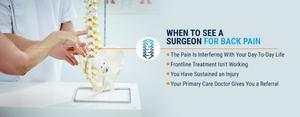Back pain is a frustrating experience most people will go through at some point in their lives. Even a minor ache in your lower back can be distracting. Typically, back pain is linked to common issues, like strained muscles. After a few days of mild discomfort and over-the-counter remedies, the pain usually goes away.
In fact, 90 percent of patients with acute low back pain will return to work within three months. However, this isn’t always the case. When you are experiencing regular back pain that won’t respond to your regular painkillers and light stretching, you are probably starting to wonder if it is time to see a doctor.
While back pain is definitely a concern, it does not automatically mean you will need to see a spine surgeon and schedule a procedure. In this guide, we’ll discuss when seeing a spine specialist is the right answer for you.
When to See a Surgeon for Back Pain
Spine surgery can be an effective treatment for a number of conditions causing back pain, but it is rarely the first option. You may want to seek intervention from a surgeon when:
1. The Pain Is Interfering With Your Day-To-Day Life
In many cases, back pain is frustrating but manageable. You can go to work and keep up with your routine, despite your symptoms. However, if you find your back pain is slowing you down considerably or stopping you from enjoying certain activities, a surgeon may be able to determine the root cause and suggest options for more effective treatment.
2. Frontline Treatment Isn’t Working
Before deciding if surgery is the answer, your physician will likely prescribe a number conservative treatment options. Over-the-counter painkillers, heat, ice, prescription medication, physical therapy and steroid injections are common treatment approaches taken prior to surgery. If you have been following your doctor’s instructions only to have your symptoms persist or worsen, it is time to consider talking to a spine surgeon.
3. You Have Sustained an Injury
Many pain conditions can be the result of normal wear and tear as we age, but others could be the result of a specific injury. For example, a car accident, a fall or a sports injury could all potentially result in damage that needs to be addressed by a spine surgeon.
Anyone who has experienced acute back pain following an injury or accident could be suffering from a fractured vertebra or herniated disc. These injuries may not require surgery, but they do need to be evaluated by a specialist to determine the severity and the proper course of treatment.
4. Your Primary Care Doctor Gives You a Referral
For many people, a primary care physician is the first point of contact for any medical care, routine or otherwise. Your primary care doctor can help perform an initial assessment of back pain, prescribe medication, order imaging tests, suggest at-home care and connect you to a physical therapist.
If your symptoms persist over time, despite the care your primary care doctor has given, you may receive a referral to an orthopedic spine surgeon. At this point in time, your primary care doctor will be able to offer supportive care, but a specialist will be able to offer more targeted treatment.

Signs You Need to See a Spine Specialist
You know your body better than anyone else. If you are experiencing back pain, it is important to monitor how you feel. If you notice any of the following symptoms, your body is telling you it is time to seek help from a specialist:
1. Chronic Pain
Acute back pain can be very unpleasant, but it will only last for a few days to a few weeks. On the other hand, chronic back pain can last for 4 weeks and beyond. Chronic back pain can be caused by a multitude of issues, many of which can be treated without surgery. But, you need a proper diagnosis to address the cause and symptoms of chronic back pain.
A spine specialist has the knowledge and resources to understand and help you to manage chronic pain. Any type of chronic pain will affect your quality of life, and you deserve to improve the way you feel.
2. Numbness or Tingling in Your Extremities
Numbness or tingling in your arms or legs may not seem related to your back pain, but it could definitely be connected. Our spines protect a multitude of sensitive nerves, and this type of sensation in your extremities could indicate one of your spinal nerves is compressed or damaged.
For example, sciatica is a common symptom associated with low back pain. The sciatic nerve stretches from your lower back, down through the buttock and to your knee. A slipped disc may put pressure on this nerve, causing pain and numbness or tingling in the leg.
3. Weakness in Your Legs
Weakness in the leg muscles can indicate a more serious condition which needs to be addressed by a specialist. For example, a herniated disc can place pressure on spinal nerves which, in turn, can result in a sensation of weakness in one of both legs.
This symptom can affect your mobility, which can make it difficult to go to work and keep up with your other daily activities. A spine specialist will be able to use the information about your symptoms and other tests to find the cause and suggest treatment options.
4. Bladder and Bowel Control Issues
Issues controlling your bladder and bowel movements are an emergent symptom which should receive immediate attention. This lack of control could indicate serious damage to the nerves in your back. If you are experiencing bladder or bowel dysfunction along with back pain, seek the attention of a specialist.
Find Back Pain Relief at Alliance Orthopedics
If you have decided it’s time to seek the help of a spine specialist, it is important to know what to expect during your appointment. Come prepared with information on the type, duration, and location of your pain as well as any other symptoms you are experiencing. If you have undergone any previous treatment, such as chiropractic, physical therapy, and steriod injections for your pain, be sure to discuss that with the doctor, as well.
A spine specialist will likely have more questions for you and may order additional tests. If surgery is indicated, your specialist’s office will have the resources you need to prepare. Alliance Orthopedics offers a comprehensive approach to diagnosing and treating conditions that can cause back pain.
Book an appointment to connect with a specialist and move toward resolving your back pain.

